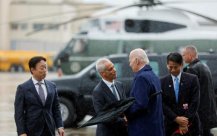
(Bloomberg, Washington) American Silicon Valley executives and Pentagon both paid attention to China's military use of artificial intelligence (AI) technology, thinking that it sounded a alarm.
Schmidt, former CEO of Google, attended the hearing of the Special Committee of the House of Representatives on Wednesday (May 17).The special competition research plan of his leadership published a report this month that China is still continuing to accumulate extensive advanced technologies to fight against the traditional combat method of the United States. As a result, the United States must reorganize the army to respond to threats.
One of the reporters Bargalara, a writer, told Bloomberg that the purpose of the report was to point out to the Ministry of Defense, Congress and the public to accelerate the urgency of the American army supported by the development of AI.However, these efforts have triggered concern about the AI military reserve competition and worrying that the competition exacerbates the opposition between China and the United States.
Schmidt warned at the hearing that, in addition to the military -civilian integration plan that China Commercial Corporation and the military closely cooperated with the military, it should also take into account that China's investment in national defense artificial intelligence far exceeds the United States.Although the United States has led a few years in key areas such as artificial intelligence and quantum computing, he warns that they have invested more manpower to engage in strategic artificial intelligence research.
Several officials of the Pentagon and Congress of the United States also believe that if the United States does not quickly develop strong AI weapons, the United States may lose in the potential conflict with China in the future.
US defense experts are worried that China will cross the red line, such as launching AI attacks on satellite and nuclear structures.Due to the hostile between the two sides, China and the United States have not fully explored the rapid upgrade risk of the use of AI.
Former US Department of Defense Alan revealed that U.S. officials have tried many times to arrange for a military AI risk dialogue with China, but each time was rejected by China.
Liu Pengyu, a spokesman for the Chinese Embassy in Washington, did not respond directly to the United States, only showing that China attaches great importance to the necessity of preventing and managing AI -related risks and challenges, and strives to actively promote the international governance of AI.




